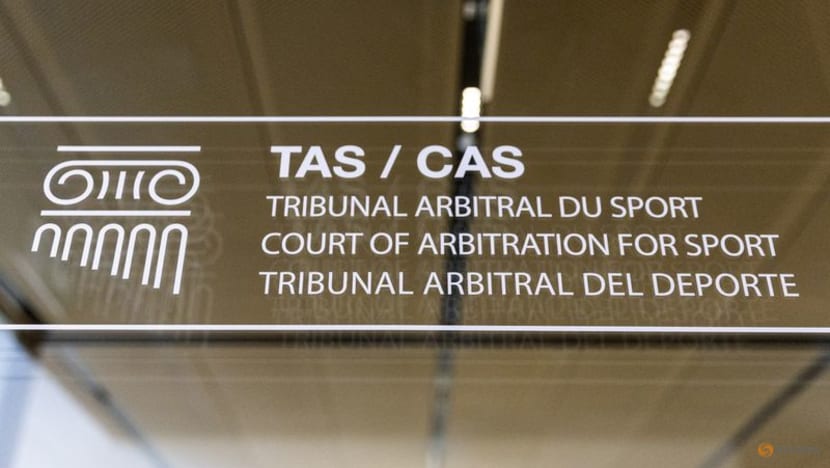EU ruling enables deeper review of CAS outcomes by national courts

FILE PHOTO: A logo is pictured on the new headquarters for the Court of Arbitration for Sport (CAS), an independent institution that resolves around 900 legal disputes in the field of sport through arbitration and mediation, in Lausanne, Switzerland, June 27, 2022. REUTERS/Denis Balibouse/ File Photo
National courts must be allowed to conduct in-depth reviews of arbitral awards by the Court of Arbitration for Sport (CAS) to ensure they are compliant with EU law, the European Court of Justice said on Friday.
The ruling comes after RFC Seraing were banned from registering new players and also fined by soccer's governing body FIFA in 2015 when the Belgian club signed agreements with a company that transferred part of the economic rights to players.
FIFA ruled their deal with a Maltese company Doyen Sports as a breach because third parties are not allowed to hold economic rights to players, with the sanctions being upheld by the CAS - sport's top court - as well as the Swiss Federal Supreme Court.
However, Seraing brought the case before Belgian courts to challenge the compatibility of FIFA's rules with EU law.
Although CAS awards are considered final and cannot be relitigated, the Belgian court approached the Court of Justice, which said such a scope is contrary to EU law.
"It is essential that recourse to arbitration does not undermine the rights and freedoms that the fundamental rules of EU law guarantee athletes, clubs and, more broadly, any other person practising a professional sport or pursuing an economic activity linked to that sport," it said.
"On those grounds, the Court of Justice rules today that the national courts or tribunals must be empowered to carry out... an in-depth judicial review as to whether arbitral awards made by the Court of Arbitration for Sport (the CAS) are consistent with EU public policy."
The Court of Justice found that in Seraing's case, FIFA made the club go to CAS to settle the dispute, rather than letting the club choose how to resolve it - a setup common in resolving sports-related disputes.
"The Court rules that, in order to ensure effective judicial protection for athletes, clubs and other individuals who might be affected as a result of pursuing a sports-related economic activity within the European Union, the awards made by the CAS must be amenable to effective judicial review," it added.
FINALITY OF CAS
The ruling effectively undermines the absolute finality of CAS decisions, especially when such decisions are based on arbitration clauses imposed unilaterally by sports bodies.
Jean-Louis Dupont and Martin Hissel, the sports lawyers representing the club, welcomed the judgment.
"It is clear that the particularly severe disciplinary sanctions imposed on RFC Seraing by FIFA, and upheld by the CAS, were the result of a procedure that was completely unlawful under EU law," they said in a statement.
"The serious damage caused must now be fully compensated... the CJEU has put an end to the procedural deception by which international sports federations attempted to evade the genuine application of EU law by imposing compulsory arbitration outside the EU."
Apart from receiving a two-year transfer ban from FIFA, the Belgian second-tier club were also fined 150,000 Swiss francs ($183,913) in 2015.
INCOMPATIBLE WITH EU LAW
The Court of Justice also said that any country's laws that treat such CAS awards as immune from further scrutiny are incompatible with EU law.
"The Court adds that a national court or tribunal is required to disapply of its own motion any national legislation or rules of a sports association that would hinder such effective judicial protection as regards individuals," it said.
Currently, all CAS awards are subject to review by the Swiss Federal Tribunal (SFT), Switzerland's highest court of law, with an average of 6 per cent of decisions being appealed each year.
CAS acknowledged that the Court of Justice's judgement determined that reviewing of CAS awards should be "limited to EU public policy only".
"CAS resolves sporting disputes worldwide and already applies EU law when required," it said in a statement.
"Whilst the vast majority of cases before CAS concern contractual and disciplinary issues not governed by EU law, matters related to EU competition law can already be challenged before EU state courts following a previous CJEU judgement."
That judgement relates to when the Court of Justice ruled that the International Skating Union's arbitration rules may conflict with EU competition law. The decision had challenged the ISU's athlete ineligibility rules.
In 2015, a German court allowed a lawsuit by five-time Olympic champion Claudia Pechstein seeking damages from the ISU over a doping ban to be heard. A civil court allowed the case to be heard after CAS ruled against it.
Reuters has contacted FIFA for comment.
($1 = 0.8156 Swiss francs)













